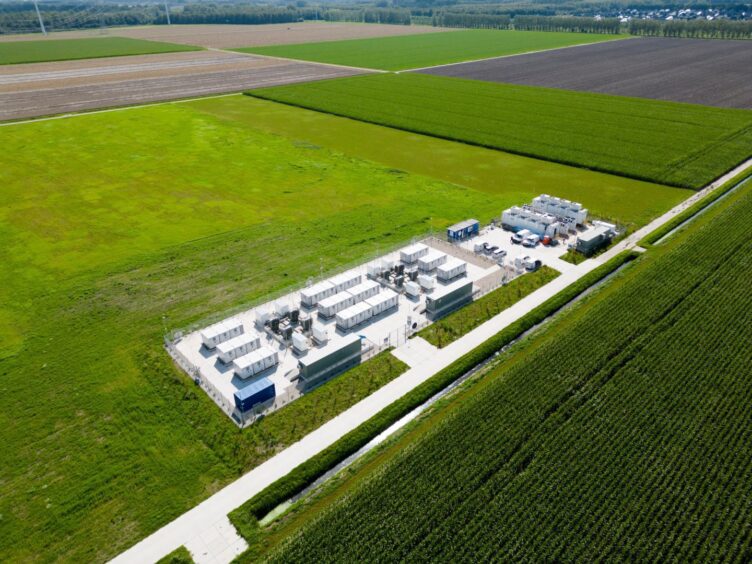
Words by Michael Urquhart, Of Counsel, CMS.
-
Some Energy Voice online content is funded by outside parties. The revenue from this helps to sustain our independent news gathering. You will always know if you are reading paid-for material as it will be clearly labelled as “Partnership” on the site and on social media channels,
This can take two different forms.
“Presented by”
This means the content has been paid for and produced by the named advertiser.“In partnership with”
This means the content has been paid for and approved by the named advertiser but written and edited by our own commercial content team.
Battery Energy Storage Systems (BESS) are becoming increasingly pivotal in the UK’s transition towards clean power, with ambitious government targets to significantly enhance capacity by 2030. While Scotland finds itself in pole position to capitalise on this ambition, it will require major investment to deliver.
Labour’s Clean Power 2030 Action Plan acknowledged our historic dependency on fossil fuels and their associated economic and environmental impact. It has pledged to harness the UK’s natural resources to help address the climate crisis and concerns about energy security.
The plan proposes ambitious increases in solar and wind power, complemented by a significant increase in UK grid capacity flexibility. Battery storage is expected to play a key role in the strategy, with the Government anticipating a five-fold increase in installed capacity.
While BESS operators have faced historical challenges in gaining recognition and support from National Grid, the shift towards more decentralised and flexible energy requirements has enhanced the value which battery energy can bring. As a result, National Grid networks are now being upgraded to better accommodate BESS within the energy mix.
With any nascent technology, securing project financing is always going to be a challenge for developers, but the BESS market is well-positioned for this. The steady reduction in the lithium-ion battery prices combined with an increasingly sophisticated market for revenues is now creating a significant opportunity for increased investment.
The Government’s commitment to increasing BESS capacity also provides a clear policy framework for investors. This strong focus on increased renewable energy sources, such as wind and solar, is driving the market for flexible storage solutions to balance supply and demand. Battery storage offers the flexibility that is an essential component within this emerging energy system.
The growing focus on ESG criteria is also likely to attract further investment into battery storage projects as a result of their alignment with the transition towards clean energy.
Scotland is currently at the forefront of the European battery storage market with several large-scale projects being earmarked for development.
Copenhagen Infrastructure Partners recently announced the commencement of two 500MW BESS projects, at Coalburn 2 in South Lanarkshire and Devilla in Fife, which are set to become the largest of their kind in Europe.
Earlier this month, Zenobe announced its 400MW Eccles Project in Berwickshire will begin operations in 2027, bringing stability and improving the reliability and affordability of the UK’s increasingly renewable power system.
Portfolio financing of BESS developments offers additional de-risking for investors where multiple projects can be grouped together to spread risk and enhance the attractiveness of investment opportunities. The pooling of resource and expertise can provide cost savings and operational efficiencies with the portfolio approach able to mitigate technical issues or delays to projects.
The increased focus on the energy storage market is likely to drive demand for portfolio financing. Last month, Constantine Energy Storage secured a landmark £180 million financing deal with a multi-national banking consortium consisting of Nord/LB, Virgin Money, EDC and Société Générale. CMS acted as legal adviser to Constantine Energy Storage on the financing of the 612MW portfolio, consisting of nine UK-located BESS projects. According to a Nord/LB source this portfolio of projects is “the largest-ever financed in Europe and will significantly boost the UK’s energy storage capabilities”.
The development of battery storage projects in Scotland is gaining momentum, driven by ambitious government targets, technological advancements, and the growing demand for flexible energy solutions.
The grid network’s historical preference for legacy energy providers is evolving, with system upgrades and policy changes favouring battery storage projects.
The emergence of new, large-scale projects exemplifies Scotland’s commitment towards expanding battery storage infrastructure. The de-risking of investment through portfolio financing is attracting commercial banks and institutional investors, who will drive this market forward to further support the transition towards clean energy.
As the UK progresses towards its net zero targets, battery storage is set to play a crucial role in ensuring a reliable, resilient, and sustainable energy future.
